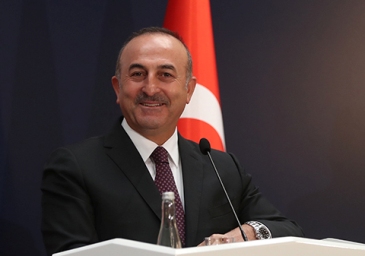
Mevlüt Çavuşoğlu, Minister of Foreign Affairs, Turkey
Urban myths have crept into European public debates about Turkey. Every now and then, one has to pause and deflate a few of them. Let me do so on five key issues.
Syria: Turkey has been pulling every string to achieve three objectives. First, it is leading efforts to alleviate the humanitarian suffering. The number of Syrian refugees exceeds 5.5 million (or five Birminghams) and most have taken shelter in Turkey. We have become the number one per capita spender on humanitarian assistance in the entire world.
Second, we are taking the initiative to deny terrorist entities any room in Syria. Turkey is using force against both the Kurdish PKK/YPJ and Daesh, and is taking the utmost care not to harm civilians. We will continue to expose the dark propaganda that aims to mislead public opinion about Turkey’s role in Syria. We have also exposed collusion among terror networks, such as how PKK/YPG terrorists are purporting to fight Daesh while allowing them to roam freely.
Third, Turkey is working hard to promote a political solution. From the Astana talks to the Sochi congress, Turkey has been on the side of ultimately engendering a political solution to the Syrian quagmire at the UN-led Geneva talks, based on Syria’s territorial integrity and reflecting the will of the Syrian people. Operation Olive Branch, launched by Turkey, while protecting our citizens, aims to clear the road to peace by taking action against the threat to Syria’s territorial integrity posed by terrorist entities. Fighting Daesh must not mean that we do not fight the other terrorists. We ask the US and others to stop arming the PKK/YPG.
The Middle East: this region is Europe’s neighbourhood and urgently needs a grand bargain. Europe found peace when, in Helsinki in the mid-Seventies, we recognised the inviolability of frontiers and pledged to respect human rights and fundamental freedoms. The Middle East needs that sort of a contract now more than ever to find its own peace.
Nation states are under attack from transnational forces, some benign and some – such as separatism, sectarianism and terrorism – harmful. The resilience of nation states needs strengthening against such harmful forces. This, and not the endless splintering of states, is the formula for the security and wellbeing of everyone in the region and beyond. The region needs an order that is home-grown and takes existing borders as a given, including a state for the Palestinians as mandated by the United Nations seven decades ago.
Turkey’s fundamental orientation: Turkey is a strong, resolute, active Nato ally and a democracy that is filtering out massive numbers of hazards before they can reach Europe. As such, Turkey is an essential organ of the European and transatlantic body. It is true that my people are unhappy with the positions taken by several allies on a number of topics. While there is unity in diversity, we have to stop before we go from diversity to discord and show mutual (not one-sided) solidarity.
Turkey’s EU membership: this is to everyone’s benefit, and the pace is controlled not by Turkey but by the EU. But let us set our optics right: without Turkey, Europe will be left exposed and vulnerable. In the economic sense, too, Turkey is an asset, thanks to an economy that is growing at levels that any European country would love to emulate. The idea that Turkey will be a burden to the EU is therefore incorrect.
It should be appropriate to prepare our populations for the positive eventuality of Turkish membership rather than caving in to extremists that threaten to redefine the political centre in too many European countries. Protecting democracy, peace and prosperity will depend on how Europe tackles the drift to the extremes, and Turkey is part of the solution. A visa liberalisation regime is the first step forwards to take.
Democracy in Turkey: only 20 months ago, a group of fanatics sought to overthrow democracy in Turkey by force. In an epic confrontation, the people and the state of Turkey defeated this attempt by a novel form of terror organisation called FETÖ.
The Turkish people want to live in a democratic country. Now, we are going through a necessary phase during which we make sure that FETÖ members, including sleeper cells, are removed from all positions of power in the state organs, media, business and academia. This is a painful process but we act strictly within the confines of law. Mechanisms to review decisions are in force. All that when we are simultaneously fighting other terrorists across the border. The state of emergency will end as soon as there is no longer a need for it, and no one will be happier for it to be over than our own government.
In our day and age, the information and disinformation that flow in all directions at unprecedented volumes confuse even the sage. However, it is time to move beyond such confusions, for all of us to re-intensify contacts and processes at all levels, and to show mutual solidarity.
Originally published by The Telegraph on 2 March 2018